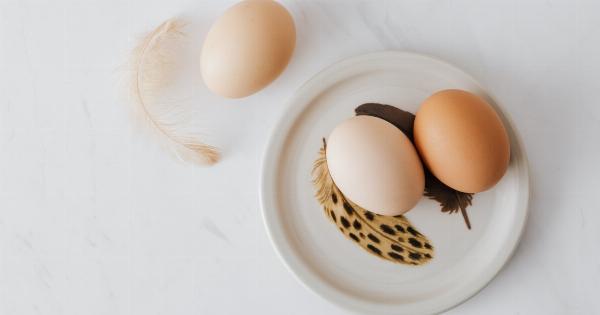Living a healthy and balanced lifestyle is essential for maintaining optimal physical and mental well-being. However, in our fast-paced and stressful world, it can sometimes be challenging to prioritize our health.
High cholesterol levels, stress, and elevated blood pressure are common health concerns that can lead to serious medical conditions if left unmanaged. While there are various medical treatments available, many individuals are seeking natural alternatives to support their overall health.
One such solution is the use of natural herbs that have been found to effectively reduce cholesterol, relieve stress, and manage blood pressure.
The Role of Cholesterol in Our Body
Cholesterol is a waxy substance produced by the liver and is essential for the proper functioning of our cells. However, high levels of cholesterol in the blood can increase the risk of heart disease and stroke.
It is crucial to keep our cholesterol levels in check by incorporating heart-healthy habits and, where necessary, by utilizing natural herbs that aid in lowering cholesterol.
1. Garlic
Garlic is an ingredient found in almost every kitchen, but its benefits go far beyond enhancing the flavor of our favorite dishes. Studies have shown that garlic can reduce cholesterol levels by preventing the liver from producing excess cholesterol.
Additionally, it may also help to lower blood pressure, making it a valuable herb for overall cardiovascular health.
2. Turmeric
Turmeric, a vibrant yellow spice commonly used in Indian cuisine, contains a compound called curcumin. Curcumin has been studied extensively for its potential health benefits, including its ability to lower LDL (bad) cholesterol levels.
Turmeric also has antioxidant and anti-inflammatory properties, which can contribute to a healthy heart.
3. Ginger
Ginger is well-known for its digestive properties, but it has also been found to have cholesterol-lowering effects.
Research suggests that ginger can reduce total cholesterol levels and LDL cholesterol, while simultaneously increasing HDL (good) cholesterol levels. Incorporating ginger into your diet can be as easy as adding it to a cup of herbal tea or including it in your favorite recipes.
4. Hawthorn
Hawthorn is an herb with a long history of use in traditional medicine for its cardiovascular benefits. It has been found to improve blood flow, lower cholesterol levels, and reduce blood pressure.
The berries, leaves, and flowers of the hawthorn plant can be used to make teas, tinctures, or capsules for convenient consumption.
5. Holy Basil
Holy basil, also known as Tulsi, is a sacred herb in India with powerful adaptogenic properties. Adaptogens help the body adapt to stress and promote overall well-being.
Holy basil has been shown to reduce stress by lowering cortisol levels and improving cardiovascular health by reducing cholesterol and blood pressure.
6. Green Tea
Green tea is a popular beverage known for its numerous health benefits. It contains antioxidants called catechins, which have been shown to reduce cholesterol levels and lower the risk of heart disease.
Regular consumption of green tea can help promote heart health and overall well-being.
7. Cinnamon
Cinnamon is not only a delicious spice but also a natural herb that can help manage cholesterol levels.
Studies suggest that cinnamon can reduce total cholesterol, LDL cholesterol, and triglyceride levels in individuals with diabetes, making it a valuable addition to their diets. Sprinkle some cinnamon on your oatmeal or incorporate it into your baked goods for a healthy and flavorful twist.
8. Fenugreek
Fenugreek seeds have been used as a traditional remedy for numerous ailments, including high cholesterol. Research indicates that fenugreek can help lower total cholesterol, LDL cholesterol, and triglyceride levels.
Additionally, it may also positively impact blood sugar control. Adding fenugreek seeds or powder to your meals or consuming them in capsule form can be beneficial for managing cholesterol levels.
9. Artichoke
Artichoke extract has been found to have lipid-lowering effects, making it an ideal herb for reducing cholesterol levels. It works by inhibiting the enzyme involved in cholesterol synthesis and increasing the excretion of cholesterol.
Artichoke extract is available as a supplement and can be used as a natural alternative to traditional cholesterol-lowering medications.
10. Oregano
While most commonly used as a culinary herb, oregano also has potential health benefits. It contains compounds such as carvacrol and thymol, which have been found to lower cholesterol levels.
Incorporate oregano into your meals or brew it as a tea for a flavorful and heart-healthy addition to your diet.
Conclusion
Managing cholesterol, stress, and blood pressure levels is crucial for overall health and well-being.
Incorporating natural herbs into your daily routine can complement a healthy lifestyle and aid in reducing cholesterol, relieving stress, and managing blood pressure. However, it is important to consult with a healthcare professional before incorporating any herbal remedies into your routine, especially if you have pre-existing medical conditions or are taking medications.






























